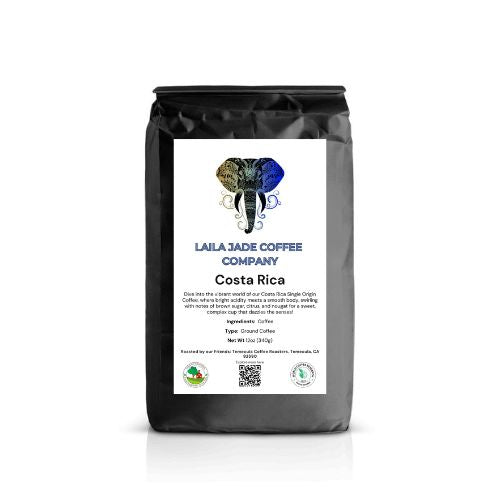Costa Rica
Discover the essence of Costa Rica with our single origin coffee, a true testament to the region's rich coffee-growing heritage. Our beans are meticulously sourced from the finest coffee farms, ensuring each cup delivers an unparalleled experience.
With bright acidity, this coffee offers a lively and vibrant taste that dances on your palate, providing a refreshing and invigorating experience. The smooth body delivers a silky and well-rounded mouthfeel, perfectly complementing its complex flavors.
Subtle notes of caramelized brown sugar add a touch of sweetness, enhancing the overall depth of the coffee. Hints of citrus bring a zesty twist, creating a perfect balance with the natural sweetness. A whisper of nougat offers a creamy, nutty undertone that enriches the coffee's complexity. The inherent sweetness ensures a pleasant and enjoyable cup every time.
Indulge in the sweet, complex symphony of our Costa Rica single origin coffee, where bright acidity meets a smooth body, and the flavors of brown sugar, citrus, and nougat create an unforgettable coffee experience. Perfect for those who appreciate the finer nuances of coffee, our Costa Rica blend is sure to become your favorite go-to for a refined and satisfying brew.
Medium-light roast
Couldn't load pickup availability


USP
Brew excellence at home with Laila Jade Coffee, where every bean is a pledge to purity and sustainability. As a family-owned and service-connected disabled veteran owned business, we offer roast to order, specialty-grade, organic, and Fair Trade Certified coffees shipped directly to your door. Proud supporters of World Coffee Research and Trees for Education, every purchase helps nurture both the planet and our future.

Roast Body

Medium-Light Roast
A coffee's roast level significantly affects flavor profile. Light roasts offer bright acidity and preserve the bean’s original fruity or floral notes. Medium roasts balance flavor and body, emphasizing caramel-like characteristics. Medium-dark roasts introduce bolder, spicier flavors with a touch of smokiness. Dark roasts deliver the most intense flavors with notable smoky and chocolate tones, reducing acidity.
Processing
A coffee’s process describes how the seed is separated from the coffee cherry. Popular methods include washed, dry, and honey, but there are many other processes that put special emphasis on different aspects of these methods.
100% ARABICA COFFEE,SOURCED RESPONSIBLY,ROASTED CAREFULLY.
When you savor a cup of our 100% Arabica coffee, you’re experiencing more than just a beverage. Our commitment to quality starts with sourcing beans from the world’s finest coffee-growing regions, where the climate, soil, and altitude come together to produce exceptional Arabica coffee. Arabica beans are celebrated for their smooth, nuanced flavor profiles, ranging from sweet and fruity to rich and chocolatey, with lower bitterness compared to other coffee varieties. This attention to quality continues through our meticulous roasting process, where each batch is carefully crafted to bring out the beans' unique characteristics, ensuring a balanced and flavorful cup every time.
Frequently asked questions
What makes Costa Rican coffee unique?
Costa Rican coffee is unique primarily due to its exceptionally clean, crisp, and bright flavor profile, often accompanied by a higher acidity that enhances its taste. The country’s volcanic soil and ideal microclimates across various regions, such as Tarrazú, Central Valley, and Tres Ríos, contribute significantly to these distinctive flavors. Furthermore, Costa Rica was one of the first countries to process coffee using the washed method, which helps produce a purer, more vibrant cup. This focus on quality over quantity, along with strict national standards that mandate only Arabica beans be grown, ensures that Costa Rican coffee remains among the best in the world.
Which Costa Rican areas are known for producing high-quality coffee?
Costa Rican coffee is grown predominantly in the central part of the country, where the altitude and climate are most favorable. Key coffee-growing regions include Tarrazú, known for its high-quality beans; the Central Valley, which produces beans with a balanced cup; Tres Ríos, renowned for its rich volcanic soil; and the West Valley and Guanacaste areas. These regions benefit from Costa Rica's rich volcanic soil and mild, subtropical climate, which are ideal for growing coffee. The diverse microclimates across these areas allow for a variety of coffee profiles, making Costa Rican coffee highly prized on the international market.
Can I use Costa Rican coffee beans for different brewing methods?
Yes, Costa Rican coffee beans are highly adaptable to various brewing methods due to their balanced acidity and well-rounded flavor profiles. Whether you prefer drip coffee, which accentuates their clean and crisp qualities, or espresso, which brings out their richness and complexity, Costa Rican beans perform well. They are also excellent for pour-over and French press methods, which can highlight the subtle floral and fruity notes often found in these beans. This versatility makes Costa Rican coffee a favorite among coffee enthusiasts who appreciate its ability to shine across different preparation techniques.
Are Costa Rican coffees ethically sourced?
Costa Rican coffees are often ethically sourced, thanks to the country's strong emphasis on environmental sustainability and fair labor practices. Costa Rica has a well-established reputation for progressive environmental policies, including significant protections for workers and a push towards sustainable coffee production. Many coffee farms in Costa Rica adhere to certifications such as Fair Trade, Rainforest Alliance, and Organic, which ensure that the coffee is produced under ethical conditions that benefit both the environment and the workers. Consumers looking to purchase ethically sourced Costa Rican coffee should look for these certifications as a guarantee of ethical practices.
What is your return policy?
At Laila Jade Coffee, we stand behind the quality of our products and want every customer to be satisfied with their purchase. We understand that tastes differ, and we strive to ensure that all of our customers enjoy their coffee experience. To initiate a refund, please contact our customer service team via email at rick@lailajadecoffee.com. Provide your order number, the date of purchase, and a brief explanation of your dissatisfaction.
What flavor notes can I expect from Costa Rican coffee?
Costa Rican coffee is renowned for its exceptionally bright and clean flavor profile, typically featuring a medium to high acidity. Common flavor notes include citrus, particularly hints of orange or lemon, which contribute to its lively character. Additionally, many Costa Rican coffees display sweet berry notes, chocolate, and honey, with some varieties offering a subtle nuttiness or a floral touch that complements the coffee's smooth finish. These qualities make Costa Rican coffee highly appreciated for its delicate yet complex flavors that are well-balanced and refreshing.
Is Costa Rican coffee more acidic than other types of coffee?
Costa Rican coffee is generally known for its pronounced acidity, which is often higher than many other coffee origins, especially those from lower altitudes or different growing conditions. This bright acidity is a defining characteristic of Costa Rican coffee, contributing to its vibrant and refreshing flavor profile that includes citrus and floral notes. However, it is typically less acidic than some African coffees, such as those from Ethiopia or Kenya, which are famous for their extremely bright and fruity acidity. The balanced yet distinct acidity in Costa Rican coffee makes it a favorite among those who appreciate a lively cup with crisp, clean flavors.
Why is high-altitude growing important for Costa Rican coffee beans?
High-altitude growing is crucial for Costa Rican coffee beans because it significantly impacts their flavor and quality. The cooler temperatures at higher elevations slow the growth of the coffee cherries, allowing more time for complex sugars to develop, which enhances the flavor profile of the beans. This results in coffee with higher acidity and more pronounced aromatic and flavor nuances, typically featuring bright citrus and floral notes. Additionally, these conditions often mean fewer pests and diseases, which helps maintain healthy crops and promotes the production of higher quality beans. Thus, high-altitude farms in Costa Rica are able to produce some of the most flavorful and sought-after coffees in the world.








